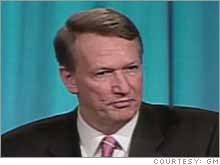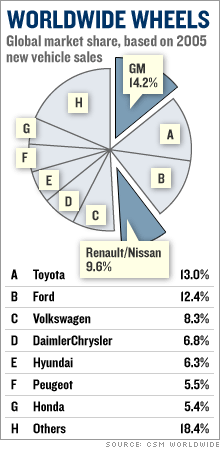|
Deal or no deal: Big risks for GM An alliance with Nissan and Renault could lower costs and keep some plants running. But there are downsides. NEW YORK (CNNMoney.com) -- There are considerable risks to General Motors and CEO Rick Wagoner after his Friday meeting with Carlos Ghosn, the CEO of both Nissan and Renault, even though Ghosn is now on record saying he doesn't want Wagoner's job. The two men agreed to a 90-day review of a possible alliance between GM (Charts), the embattled company barely hanging onto the title of world's No. 1 automaker, and Nissan (Charts) and Renault, which have had a seven-year alliance and combined are the No. 4 carmaker worldwide after GM, Toyota (Charts) and Ford (Charts).
The alliance is being pushed by Kirk Kerkorian, who with a 9.9 stake in GM is its largest individual shareholder, and who argues that linking product development and manufacturing could save billions. One advantage of a link-up is that it could put Ghosn, the man credited with pulling Nissan back from the edge of bankruptcy, in charge of GM. But Ghosn told CNN and CNNMoney.com Thursday that he isn't interested in the CEO job, even if he is open to having a spot on the GM board if the three companies reach some kind of deal to invest in one another. Many analysts say they think an alliance is still unlikely. But they also say that there are risks for GM just having these talks, no matter what direction they go. Risks of a deal The most commonly cited risk is that an alliance could distract top GM brass from the many challenges they face. The company is cutting 30,000 hourly workers, about a quarter of its U.S. blue-collar staff, as it moves ahead with plans to close a dozen plants and facilities. It is still trying to put the final touches on a deal with its bankrupt former parts unit Delphi to keep union workers there happy and on the job, preventing a strike that would quickly shut down GM as well. GM is also selling a majority stake in GMAC finance, its most profitable unit, because GM's junk bond status has driven up its cost of capital. And perhaps most important, GM faces difficult negotiations with the United Auto Workers union on a new contract. The current pact expires in September 2007. GM's official line is that it can keep all those balls in the air at the same time it adds a possible Nissan-Renault alliance to the mix. But others don't believe that's the case. "They're struggling to find ways to restructure their own costs, and this could become a big distraction for them," said Bob Schnorbus, chief economist for J.D. Power & Associates. "It's not clear what the immediate advantages to them are going to be if they go ahead with an alliance." And many experts say that cutting costs is in some ways the least challenging task facing the company. At some point, preferably soon, GM must develop a new generation of vehicles that can stop the slide in its U.S. market share and attract buyers without resorting to big incentives. And it must do that in the face of record high oil prices that are hurting sales of SUVs and pickups, its most profitable vehicles. "What I most want to see at GM is a product-led recovery," said Efraim Levy, the senior auto equity analyst at Standard & Poor's. "If you're not getting the product you need and you keep losing market share, then cutting people now doesn't solve the problem. It's just the cut you make ahead of the next one." Auto alliances also take a time to pay off. Nissan and Renault, seen as one of the most successful, were together for years before Nissan's losses were stemmed. Others, especially those done by GM, have been less successful. GM basically paid $2 billion to get out of a failed alliance with Fiat. That track record could make it hard to sell GM management on the benefits of an alliance with Nissan and Renault. "GM is a company that wants to get past this blind date they were set up on by Uncle Kirk and concentrate on their turnaround plan," said Kevin Tynan, auto analyst for Argus Research. "There's obviously a myriad of issues there for them to concentrate on, and there's a lot more potential there [in the internal issues] than in an alliance." But a distraction from the issues at hand isn't the only risk of going ahead with the deal, according to experts. They say that more benefits could accrue to the much smaller Nissan and Renault than to GM. And while GM has been losing market share, it still sells nearly one out of every four cars bought by Americans, and it has a huge dealer network. An alliance with even a troubled GM could mean a stronger Nissan, and thus yet another stronger competitor for GM, perhaps one better positioned to compete in pickup truck sales than before. "There is a concern that [an alliance] would be making it easier for Nissan in the U.S. market," said S&P's Levy. "Even if Nissan was using GM facilities for their production, it could be like a Trojan horse to grab more market share." Risks of no deal But GM management also risks the wrath of shareholders - and not just Kerkorian - if there isn't a deal with Nissan and Renault. While the stock is the best performer on the Dow in 2006, that rise has been from very low levels, and it's still off about 26 percent from a year ago. The stock sank about 3 percent Friday, partly on disappointment that Ghosn said he didn't want the CEO job. How much it might fall if the deal is called off is tough to say. Shareholders were angry enough with GM to vote against the company's recommendation at this year's annual meeting on two shareholder resolutions that would make it easier for an outsider to win election to the board. A shareholder revolt is a real risk if GM management pulls out of alliance talks, and the company's performance continues to struggle, analysts said. "That's one of the big reasons you don't have Wagoner dismissing it [an alliance] out of hand," said Tynan. "I would say that you definitely don't have an open calendar here with this. There's a lot of progress made in the turnaround, but a lot of that has been low-hanging fruit. If this is a business that continues to slide, his head could be back on the chopping block." There's also a risk for GM that Ghosn could strike a deal with one of its other competitors if GM isn't interested. Several analysts have suggested that Nissan-Renault would be a better fit partnering with Ford than with GM. When asked why he was talking to GM and not Ford, Ghosn said in Thursday's interview it was because the GM board had asked for the talks. He clearly believes there are advantages to expanding alliances. Related: Ghosn: Not aiming for GM CEO job Related: GM running out of gas |
|


